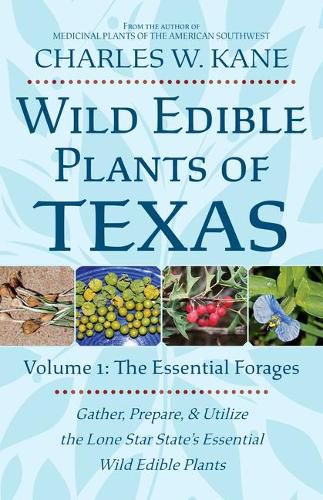Readings Newsletter
Become a Readings Member to make your shopping experience even easier.
Sign in or sign up for free!
You’re not far away from qualifying for FREE standard shipping within Australia
You’ve qualified for FREE standard shipping within Australia
The cart is loading…






Designed as a light-weight and field-portable reference booklet, Wild Edible Plants of Texas: Volume 1, highlights the Lone Star State’s most important edible wild plants. To the point and understandable, this guide best suits the prepper or outdoor enthusiast in need of a salient introduction to the field. No fluff. Just the facts. A discussion of each plant’s edible use and preparation is the publication’s primary aim, though space is also given to range and habitat, medicinal uses (if applicable), cautions, and noteworthy special considerations. Helpful additions include sustenance ratings (low, medium, or high), collection timing and desired plant-part indicators, county-by-county map-images, over 160 color photos, and a general index.
Some of the entries have a greater-than Texas range, however many are uniquely Texan and hail from a specific region. West Texas’ Chihuahuan Desert, the Hill Country of the Edwards Plateau, the Plains of the Panhandle, and the Piney Woods and Swamplands of the state’s Coastal Plain all are botanically represented.
Plant List: Agave, Algerita, Amaranth, Arrowhead, Black Cherry, Blackberry, Bumelia, Cattail, Cholla, Dayflower, Devil’s Claw, Dewberry, Dock, Dwarf Palmetto, Elder, Flameflower, Graythorn, Ground Cherry, Hackberry, Hickory, Indian Strawberry, Kudzu, Lambsquarters, Lemonade Berry, London Rocket, Lotus, Madrone, Mallow, Mesquite, Mulberry, Nettle, Oak, Passionflower, Pawpaw, Pecan, Pennywort, Persimmon, Pokeweed, Prickly Pear, Redbud, Rusty Blackhaw, Sorrel, Spring Beauty, Sugarberry, Thistle, Turk’s Cap, Walnut, Wild Gourd, Wild Grape, Wild Oats, Wild Onion, Wild Plum, Wild Sunflower, Winecup, Yaupon Holly, Yellow Nutsedge, Yucca (Fruit), and Yucca (Stalk).
$9.00 standard shipping within Australia
FREE standard shipping within Australia for orders over $100.00
Express & International shipping calculated at checkout
Stock availability can be subject to change without notice. We recommend calling the shop or contacting our online team to check availability of low stock items. Please see our Shopping Online page for more details.
Designed as a light-weight and field-portable reference booklet, Wild Edible Plants of Texas: Volume 1, highlights the Lone Star State’s most important edible wild plants. To the point and understandable, this guide best suits the prepper or outdoor enthusiast in need of a salient introduction to the field. No fluff. Just the facts. A discussion of each plant’s edible use and preparation is the publication’s primary aim, though space is also given to range and habitat, medicinal uses (if applicable), cautions, and noteworthy special considerations. Helpful additions include sustenance ratings (low, medium, or high), collection timing and desired plant-part indicators, county-by-county map-images, over 160 color photos, and a general index.
Some of the entries have a greater-than Texas range, however many are uniquely Texan and hail from a specific region. West Texas’ Chihuahuan Desert, the Hill Country of the Edwards Plateau, the Plains of the Panhandle, and the Piney Woods and Swamplands of the state’s Coastal Plain all are botanically represented.
Plant List: Agave, Algerita, Amaranth, Arrowhead, Black Cherry, Blackberry, Bumelia, Cattail, Cholla, Dayflower, Devil’s Claw, Dewberry, Dock, Dwarf Palmetto, Elder, Flameflower, Graythorn, Ground Cherry, Hackberry, Hickory, Indian Strawberry, Kudzu, Lambsquarters, Lemonade Berry, London Rocket, Lotus, Madrone, Mallow, Mesquite, Mulberry, Nettle, Oak, Passionflower, Pawpaw, Pecan, Pennywort, Persimmon, Pokeweed, Prickly Pear, Redbud, Rusty Blackhaw, Sorrel, Spring Beauty, Sugarberry, Thistle, Turk’s Cap, Walnut, Wild Gourd, Wild Grape, Wild Oats, Wild Onion, Wild Plum, Wild Sunflower, Winecup, Yaupon Holly, Yellow Nutsedge, Yucca (Fruit), and Yucca (Stalk).